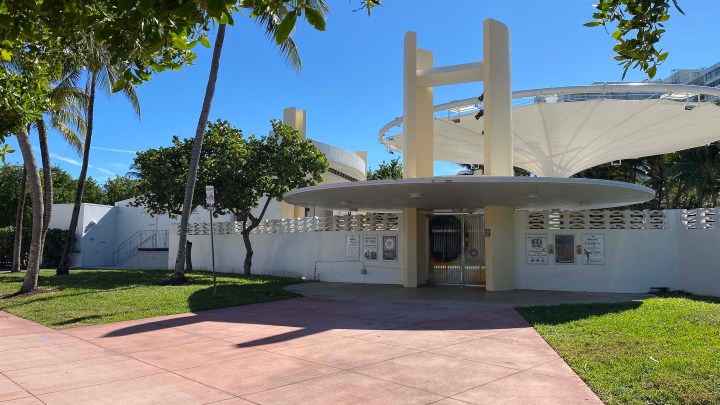
Contact-tracing program aims to spread safety at Miami Beach businesses
Contact-tracing program aims to spread safety at Miami Beach businesses

Contact tracers help stop the spread of COVID-19 by tracking down anybody who comes into contact with somebody who tests positive for the disease. Tracers spend a lot of time on the phone with people who might have been exposed. They call to make sure those people quarantine away from the public.
In December, the city of Miami Beach, Florida, started a contact-tracing program called Race to Trace for hotels, restaurants and arts venues. The goal is to help those businesses operate more safely.
At the North Beach Bandshell in December, singer Ceci Leon performed during the venue’s first event that was open to the public. For most of the pandemic, this outdoor stage streamed its events online, but on this night, 150 people were allowed in, seated 6 to 8 feet apart. All wore face masks.
Attendees agreed to give their names and contact information to the Rhythm Foundation, which manages the place.
“We actually have a personal liaison from the Department of Health who is in constant contact with me,” said Benton Galgay, a director at the nonprofit, which joined Race to Trace.
That contact tracer asks for a guest list if anyone tests positive. The Department of Health has seven contact tracers available to Miami Beach businesses. One of their jobs is to establish relationships with the companies they follow and provide safety training. The program is funded with a $455,000 grant from the Rockefeller Foundation.
So far, about 50 companies have signed up. The Carillon Miami Wellness Resort in Miami Beach is one of them. Patrick Fernandes, a company director, said the training and support have been helpful.
“It certainly has allowed us to be more confident in our ability to operate a business during a pandemic,” he said.
Carillon has passed along information about two positive COVID-19 cases so far, Fernandes added.
“I love working on it, personally,” said Marina Pravdic, a manager on the project for the Rockefeller Foundation. One priority is to protect workers in the hospitality industry, and many of those workers are Black or Latinx — “two of the communities that have been the most disproportionately impacted by this pandemic,” she said.
When the program ends in August, its success will be measured by how many businesses signed up, how many people the contact tracers reached and the number of employees who said they felt safer at work.
There’s a lot happening in the world. Through it all, Marketplace is here for you.
You rely on Marketplace to break down the world’s events and tell you how it affects you in a fact-based, approachable way. We rely on your financial support to keep making that possible.
Your donation today powers the independent journalism that you rely on. For just $5/month, you can help sustain Marketplace so we can keep reporting on the things that matter to you.












